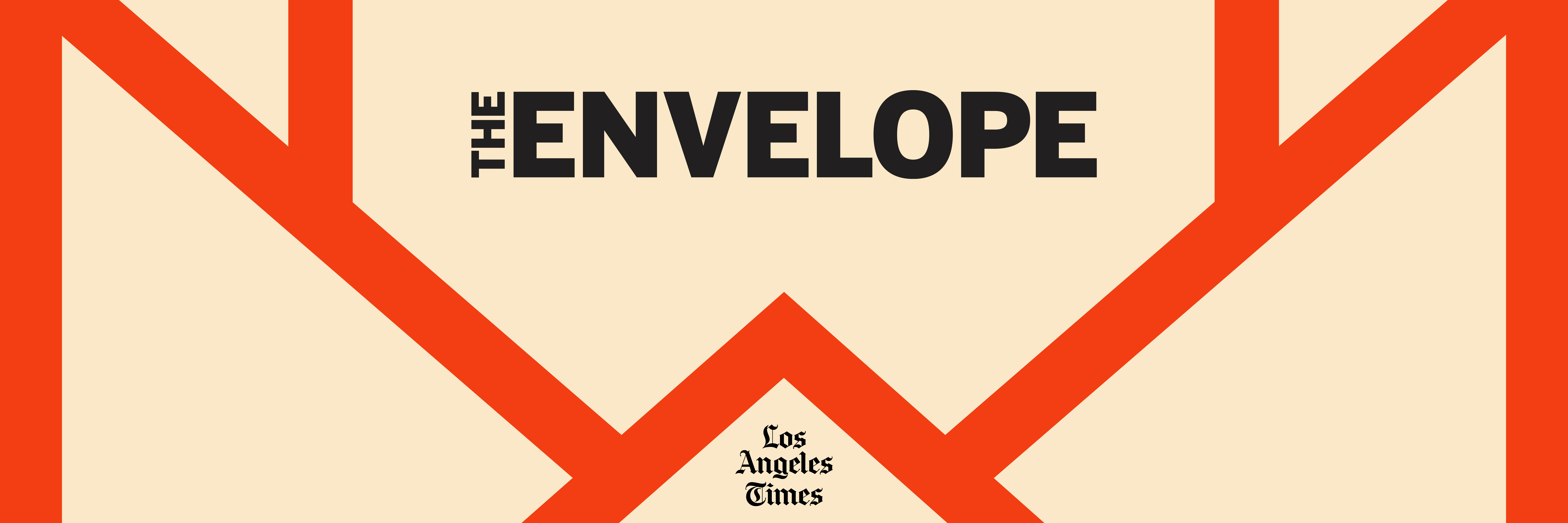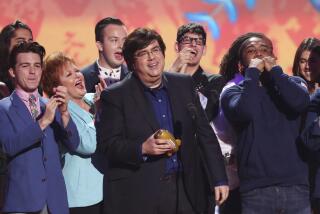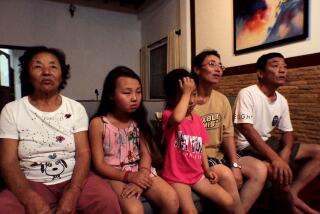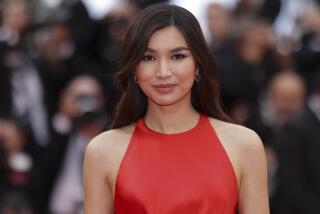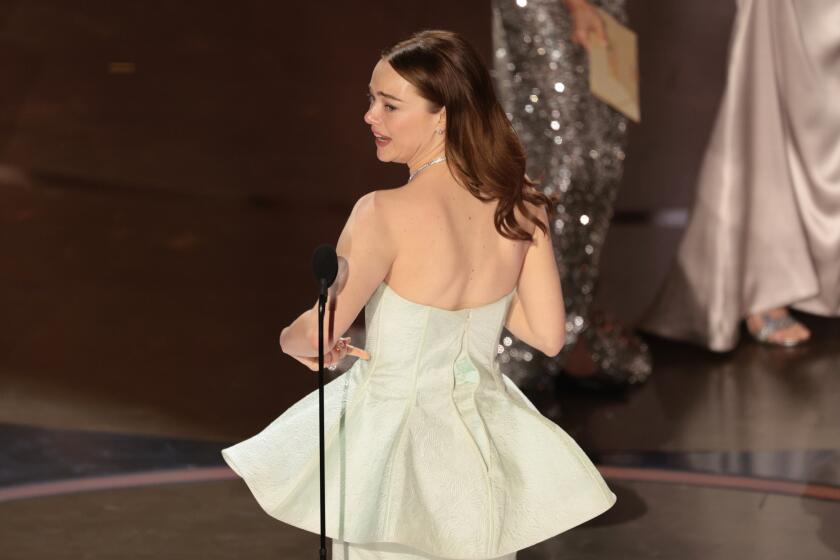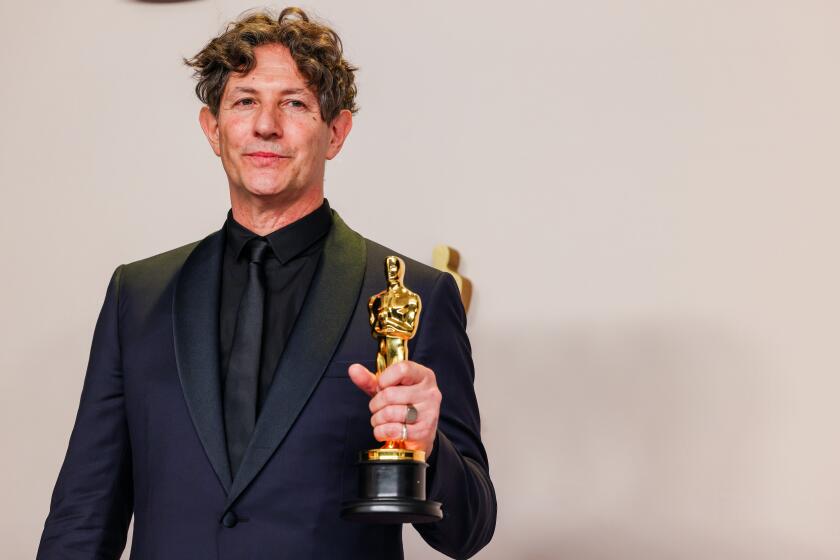Follow us wherever you get your podcasts:
Daniel Dae Kim recounts how an attack on his sister catalyzed his fight against AAPI hate crimes, his greatest fear when it came to “Lost,” and why having a seat at the table as a producer is both “liberating” and “soul-destroying.” Plus, he discusses his first lead role: an FBI agent on National Geographic’s “The Hot Zone: Anthrax.”
Yvonne Villarreal: Hey, everyone. We’re back to our regularly scheduled programming as we settle into 2022.
Mark Olsen: Yes, and we have some great guests coming up in the weeks ahead. Maggie Gyllenhaal, Beanie Feldstein, Pablo Larrain, to name just a few.
Yvonne Villarreal: And today’s guest is Daniel Dae Kim. So let’s get things started. Do we remember how to do this?
Olsen: I’m Mark Olsen.
Villarreal: and I’m Yvonne Villarreal. This is “The Envelope,” the L.A. Times podcast where we dive deep with your favorite stars from TV and film. You probably know Daniel best from shows like the ABC drama “Lost” and CBS’s reboot of “Hawaii Five-0.”
Olsen: He’s got those bingeable TV roles on lock.
Villarreal: Oh, for sure. But in addition to his acting, Daniel has been making waves as a producer and as an activist. He’s really used his platform to address the rise in racist attacks against the AAPI community.
[Archival clip from 03/18/2021 House Judiciary Meeting subcommittee hearing on discrimination and violence against Asian Americans: Daniel Dae Kim:...whether the country we call home chooses to erase us or include us. Because you may consider us statistically insignificant now, but we are 23 million strong, we are united and we are waking up.]
Villarreal: So today we talk about his activism navigating Hollywood and the challenges he comes up against as an Asian man in this industry. Plus, we talk about his first lead role ever. He stars in National Geographic’s anthology series “The Hot Zone.”
[Archival clip from “The Hot Zone: Anthrax”: Agent Riker: Anthrax spores do not just die. They settle. They lie in wait.]
Villarreal: This season is called “Anthrax,” and it takes place just after 9/11, as a string of bioterrorism acts cause widespread panic. Daniel plays Matthew Riker, an FBI agent tasked with tracking down the anthrax killer
[Archival clip from “The Hot Zone: Anthrax”: Agent Riker:...it’s a ticking time bomb. I saw it with my own eyes. Get out.]
Villarreal: Daniel, welcome to “The Envelope.”
Daniel Dae Kim: It’s great to be here. Thanks for having me.
Villarreal: So let’s jump right into things. Matthew Riker, the FBI agent you play on “The Hot Zone,” is your first leading role. How do you feel about that?
Daniel Dae Kim: I feel good. There’s really nothing to feel bad about. I’ve been working in the business now for over 30 years, and I’ve done my share of under-fives, recurrings. I was even an extra. So I’ve really climbed the ladder in a sense, and it’s nice that after 30 years, I’ve finally gotten to this point.
Villarreal: Yeah, because at this point in your career, like you said, you’ve been doing this for three decades now. Does the size of the role matter to you?
Kim: Sure. Does size matter is what you’re asking. [Laughs] It does matter. But it’s not the only criterion. Does it say something that is unexpected? Does it tell a story that I haven’t heard before? Is it a character that I have not played before? There are a lot of different qualifications for what determines a role that I take.
Villarreal: Well, what comes with being at the top of the call sheet now? What have you observed on sets that you’ve been on and in the way others take on the role that you wanted to emulate — or maybe be sure not to emulate?
Kim: That’s a great question. After sitting on the sidelines for as long as I have, I have gotten to see my fair share of number ones, so to speak, and how they’ve done things. And I’ve learned a lot of lessons, and a lot of those lessons have been what not to do. For instance, don’t make people feel inferior. Don’t cause a toxic environment on set. Don’t make it harder for other people to work. Don’t let your insecurities and how difficult your particular situation might be affect others’ morale. I think I’ve really just placed an emphasis on harmony. It’s something that I’ve always tried to work on as an actor, as part of an ensemble, because I really feel like people need to feel comfortable and trusted in order to do their best work. And that’s not just the actors; this is the writers, the crew. I think there is a modicum of respect that can be held and given to other people that shouldn’t be so difficult.
Villarreal: Well, you probably won’t tell me who embodied the things you didn’t want to do, but can you tell me somebody that embodied how you did want to sort of model yourself after?
Kim: I was working once on an episode of “NYPD Blue” and I was a guest actor on that show.
Villarreal: I love “NYPD Blue.”
Kim: I know. This is a little bit back in the day, so I might be dating myself, but I’m glad you know what I’m referring to. At the time, Jimmy Smits was the lead on that show, and Jimmy had gotten a lot of rewrites the day that we were shooting a big scene. One of the rewrites was a long monologue, and for any actor to get a monologue literally on the day that you’re shooting, it’s a very scary, frustrating experience. And Jimmy struggled, understandably, with trying to memorize it minutes before he was supposed to shoot it. And as frustrated as he got, he kept it professional, and he never made it personal to anyone that he felt was making it difficult for him to do his best work. But we did have to stop the set and we were delayed. So, we ended up shooting the scene. And then three days after I finished working on the show, I got a knock on my door, and that knock on my door was from a production assistant from “NYPD Blue.” I opened the door and the P.A. gave me a note, and it was from Jimmy. The note said, I’m deeply sorry for how things turned out while you were working there. I just hope we get to work together in the future.” And I was so touched by that, but it wasn’t over. After the note, the P.A. pulled out, I think, at the time, a $2000 Armani suit —
Villarreal: Oh my God.
Kim: — that my character had worn on the episode. Jimmy had taken it upon himself to go into the wardrobe department. Find that suit that had been tailored to me and was way, way more expensive than any suit I could have ever purchased myself. And he gifted it to me as a way of saying thank you and sorry.
Villarreal: Do you still have this suit?
Kim: I do
Villarreal: Have you worn it?
Kim: I have. It doesn’t fit me the same anymore, and it’s a little bit out of date now, but I keep it because I always remember that gesture. You know, there’s a line in “Willy Wonka” that goes, “so shines a good deed in a weary world.” For all the number ones that I’ve worked with that have been problematic, I remember him the most because he’s the one that tells me that it can be done well. It can be done right.
Villarreal: Let’s pivot back to “Hot Zone”: There’s a lot of guilt that Agent Riker feels for being unable to stop the 9/11 attacks.
[Archival clip from “The Hot Zone: Anthrax”: Agent Riker: We had warning signs that 9/11 was going to happen. Sheila: Matthew. Agent Riker: Names, addresses even.]
Villarreal: How do you work on portraying that on screen?
Kim: A couple of ways. I remember how I felt during 9/11. It’s one of those events in our lives that everyone knows where they were on that day, during that time. And so I remember the feelings very vividly of what I was going through and the fear and the frustration and the uncertainty that I felt.
Villarreal: Where were you, by the way?
Kim: I was in Los Angeles. I had just recently moved from New York City, ironically, and I was getting ready to go shoot an episode of a TV show called “Charmed.” I got a call from my brother in the morning who said, “Turn on your TV.” And I turned it on just in time to see one of the towers fall. And, like so many other Americans and people around the world, I was glued to the TV for the next, I don’t know, day, two days. For a long time. So, that memory is very clear and vivid to me, and I could draw upon that. I think also part of my research helped me a lot. I spoke to some FBI agents, and they told me what they did, the lengths to which they went during that time and the guilt that they felt, the duty that they felt, the responsibility that they felt. Hearing their stories was really powerful and really fed my performance, I thought. Or I hope.
[Archival clip from “The Hot Zone: Anthrax”: Agent Riker: I just got a call from Florida. They’re tracking a possible anthrax attack. If this is the first indicator of a biological attack… Agent Copak: Like the one in Toledo? Turned out to be talcum powder. And what was that other one? Agent Sykes: College jock wrote “anthrax” on his protein powder so his roommates wouldn’t use it.]
Villarreal: Well, the story of the series is based on true events surrounding the anthrax attacks of 2001.
[Archival clips of presidential address: President George W. Bush: America has now confirmed several different cases of anthrax exposure in Florida, New York, New Jersey and Washington, D.C.”]
Villarreal: How do you approach a role like this as an actor? Do you feel a greater sense of responsibility to get things right?
Kim: It’s a great question, and the answer is yes. I think any time that you deal with an event that’s true and as monumental as this one, there is a responsibility to try and get things right. And I give a lot of credit to the writers and the producers because they really sweated — is that a word? — they were sweating the details to make sure that we were not being unfair in our portrayal of people and events.
Villarreal: Well, this isn’t really a spoiler, but there’s a scene in the fourth episode where you are talking to your partner on the case, and she’s kind of poking fun at you for not taking risks very often. And you say
[Archival clip from “The Hot Zone: Anthrax”: Agent Riker: There shouldn’t be any secret that when you’re the only kid in school who doesn’t fit the pattern, especially back in the 70s, and now you’re the only guy in your department who breaks the mold, you spent a lot of useless energy being the poster child for following the rules.]
Villarreal: Was that in the original script, or was that something you brought to the character yourself?
Kim: There was a version of that in the original script, and I’m very grateful to the writers that we were able to work together to kind of punch it up to something that spoke to me a little bit more directly. I mean, I think the character thinks of himself as an outsider for a number of reasons, but what was really nice was that we were able to address his ethnicity within the show. How much we did, as a matter of whether we should have done more or whether it was enough, that’s up for debate. But I think it was really crucial that if you have someone who looks like me playing this role, that somehow somewhere that should be addressed, especially because he’s playing the face of the FBI.
Villarreal: I don’t think it will come as a surprise to anyone that there are a lot of parallels between the anthrax scare and the pandemic, both in terms of the intersections of science and government kind of working together or not. And another unfortunate similarity between the current and the past, with this anthrax scare, has been the scapegoating of communities. How much of that was on your mind while making this series?
Kim: It was not lost on me that the most egregious acts against the AAPI community were happening as we were talking about the events after 9/11. Both the COVID-19 pandemic and 9/11 were monumental in that they brought the country and the world together for a while. The initial reaction was we got to figure out how to solve this. Let’s follow the rules. Let’s band together. And then the scapegoating started. In the case of 9/11 against the Muslim American community ,and in the case of the pandemic against the Asian American community. And then there were conspiracy theories that emerged as a result of both of these events. So, you’re absolutely right when you say that there were a lot of parallels and all of it fed into my character. And the fact that we were pretty much under house arrest because of this COVID lockdown provided me a situation where there was really no escaping the circumstances I was around. So, I was living this character in a way that I hadn’t anticipated, even when I left the set.
Villarreal: Well, I was going to ask, did you experience that fear directly?
Kim: During this period, I was going from set to home and set to home and really nowhere else. So I wouldn’t say that I experienced it directly. I was like everyone else reading the news, checking my social media feed and being barraged on a daily basis. And my family is no stranger to violence toward Asian Americans. I think I’ve told the story about my sister. It happened, I think, right as Trump became president. My sister was running on the shoulder of a road in her neighborhood where she ran hundreds, if not thousands of times. A man came up to her and shouted at her to get off the road. My sister went further to the side of the road, and then he pulled up and tried to hit her. And then my sister, thinking that what was happening couldn’t be true, just started running on the sidewalk. Then this man drove up onto the sidewalk to try and hit her, all the while calling her racial slurs. When he drove up onto the sidewalk, he hit her and sideswiped her, and she fell to the ground. And her injuries were such that a former marathon runner could no longer run without pain. She lives with that pain to this day.
Now, the incident is one source of trauma, but what was a bigger source of trauma for her was the way the justice system failed her. The D.A.’s reduced the sentence to something like reckless driving instead of attempted manslaughter. When there was sentencing involved, the defendant said to the judge that he had planned a vacation with his wife, could he wait to serve his sentence until after his vacation was done, and the judge agreed to it.
Villarreal: Wow. How do you not let the rage that you feel as a brother overpower the change that maybe you can do with calmness? Like, I know if I heard that happen to someone I loved, I would be angry and I would just want to break everything. But you took action in a different way.
Kim: Well, you’re right. I had all of those impulses because I’m human, and anytime a loved one is hurt physically or psychologically, it affects me deeply. And I can’t say that all of my thoughts were pure and moral, but a lot of worse things happen to a lot of people every day. And that is not meant at all to diminish or minimize what happened to my sister. It is meant to contextualize it. My sister is an unfortunate statistic, but one of many. And when you look at the larger picture and to see what’s happening to a community, and even if you expand outward to see what’s happening to our country and our society, it’s important, I think, to address the larger issue and that is scapegoating division, polarization, hatred writ large. I think that is the real heart of the issue.
[Archival clip from 03/18/2021 House Judiciary Meeting subcommittee hearing on discrimination and violence against Asian Americans: Rep. Steve Cohen: Mr. Kim, you’re recognized for five minutes. Daniel Dae Kim: Thank you.]
Villarreal: You’ve done a lot of work. You’ve testified before Congress.
[Archival clip from 03/18/2021 House Judiciary Meeting subcommittee hearing on discrimination and violence against Asian Americans: Kim: It’s crucial that we have reliable reporting for these hate crimes and an infrastructure that makes it easy for people for whom English is not their primary language.]
Villarreal: You know, sometimes when actors or creatives do advocacy work or anything related to politics, there is a sort of stay-in-your-lane backlash. Did you experience any of that? Did even like the people that work for you, your agents or managers, suggest maybe this isn’t the thing you want to do?
Daniel Dae Kim: Yes to the first part of your question. That is, I’ve gotten plenty of tweets from people saying, “Shut up and act,” or, “I used to like you until you opened your big mouth,” That kind of thing, and those are some of the nicer ones. But, you know, social media is a blessing and a curse. And I think one of the things that I’ve come to learn over the past year is that you’re never going to be able to please everyone all of the time, and there will always be a number of people who disagree with what you’re saying. And some will not be very pleasant about it. That’s a change in my perspective, because at one point I thought, “Look, if we can just get the message out there, everyone will see the sense in what we’re saying.” But our country doesn’t work like that, and nor should it maybe. I no longer speak to the ones who are hard and fast in their ways of thinking. But the people I speak to are the ones who maybe aren’t educated about the issue or want to learn about the issue, but don’t have a way in and the people who are more reasonable in their thought so that they’re open to learning. And so I try to think of those people when I post and speak on these issues.
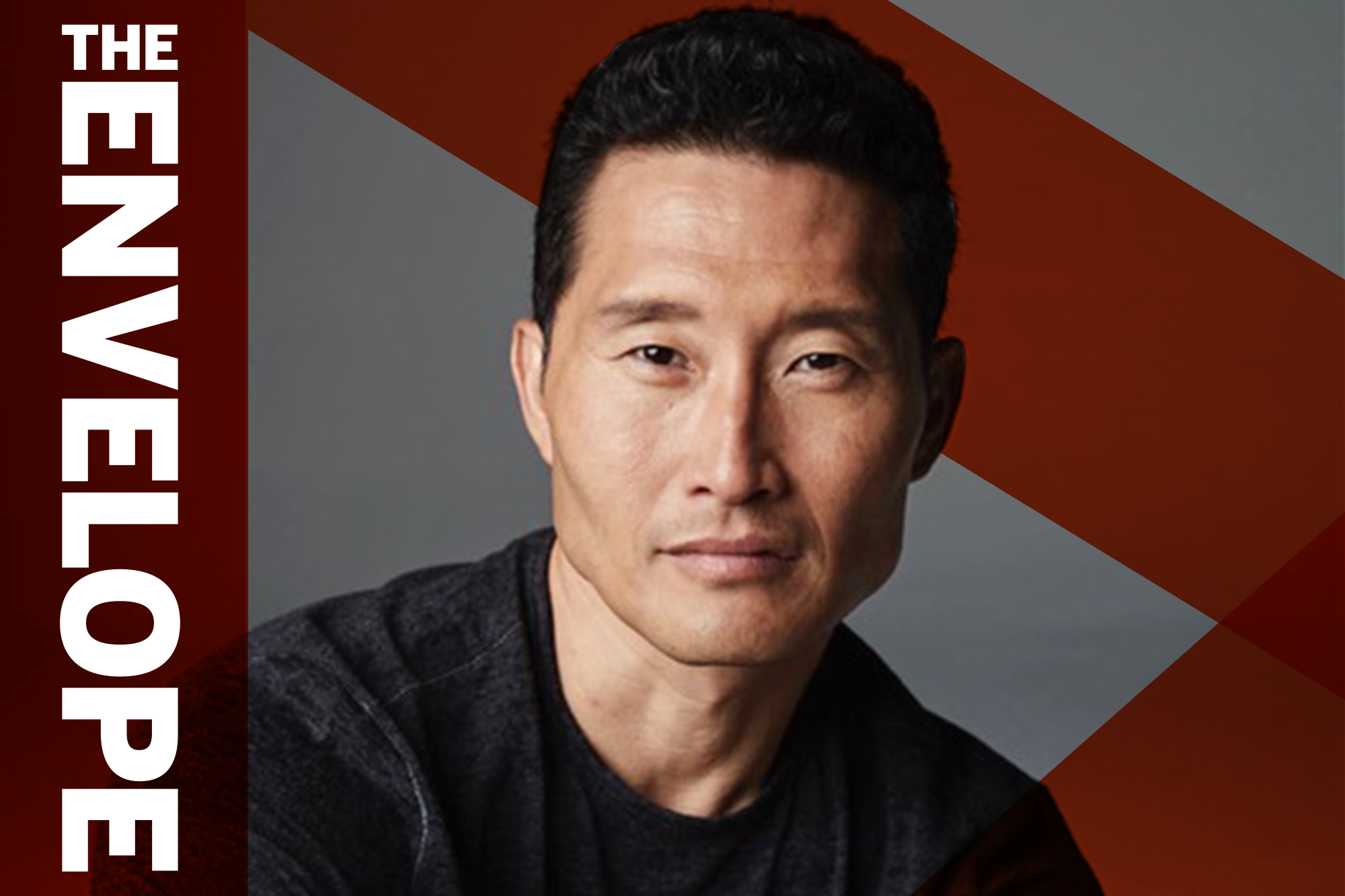
Villarreal: You started out your career in theater, and in school, you double majored in theater and political science. Did you feel like you needed a backup plan?
Kim: Well, I didn’t start college interested in acting. In fact, I had no desire to be an actor when I entered. I was thinking I was going to be a lawyer because in my family you were either a doctor, lawyer or a garbage man. One of those three. And so I took an acting class second semester of my sophomore year because I had an elective to fill, and that’s where my life changed.
Villarreal: Tell me what it was about that class. Was it the teacher that you were just like, “Oh my God, this is what I want to do.” What sparked it for you?
Kim: The thing I remember at the time, more than anything, was the freedom I felt when I was given the license and permission to be someone, to be heard, to be seen. And it took a lot of self-analysis for me to come to that conclusion that it was about my need for expression. And I think most of us who choose to become actors have something of this need for expression, validation, creative outlet. So it was a combination of all of those things, and I learned that I have relatives in my family who were artists dating back generations, and I’d never once known that while I was was growing up. It was kind of a closeted part of my family.
Villarreal: How did you find that out?
Kim: Well, once I committed to it, then my mom was kind of like, “Well, you know, your aunt is a really good visual artist, and your uncle was a really good singer.” It was all kind of trickling out.
Villarreal: Thanks, mom.
Kim: [Laughs] And my dad loves the karaoke mic, and he was always singing when I was a kid. He taught himself how to play the harmonica. So there are arts in my background, for sure.
Villarreal: Do you remember what or who maybe made you want to be an actor in the first place?
Kim: I don’t know if I know the answer to that question, but I do remember when I was a kid seeing “Top Gun” and thinking, “Wow, man, that’s pretty cool.” And I remember from that point following Tom Cruise’s career, thinking like “Look what he’s doing. He’s the leading man, and then he’s doing serious roles like ‘Born on the Fourth of July’, and he’s doing action roles and serious roles and comedy roles. I could do that.” Little did I know at the time how far away that kind of thinking was from the reality of a person who looks like me playing roles like he was playing at the time. But you know, that’s part of the beauty of youth, right? Your naivete and your innocence thinking that anything can happen.
Villarreal: But what were your goals as a young actor starting out?
Kim: I didn’t really have a specific trajectory in mind, but I really felt like I could be an actor in the movies that I loved. I remember one of the biggest auditions I had when I just started out was James Cameron’s “Aliens,” the sequel to “Alien.” Oh my God. When I say audition, I’m overstating it. I remember how much I loved “Alien,” and I thought I would love to be in that movie. It seems so funny when I think about it now, but I contacted my agent at the time, who was literally in a one room office in an old building in the middle of Manhattan, and I said, “I want to be in that movie.” And so my agent took out a piece of paper and a pen and started writing a handwritten note saying, “My client, Daniel Kim, would like to audition for a role in ‘Aliens.’” She wrote it right in front of me, as if to prove to me that she was working hard to make this happen. Me, not knowing a thing about how the business worked, I was watching her fold up the letter, put it in an envelope, and she’s going to mail it off. I was like, “There it is. That’s what’s going to get me an audition for ‘Aliens.’” You know the ending to this story. There was no audition, and I’m not in that movie
Villarreal: [Laughs] That gave me so much Joey vibes, but I love it. Like Joey Tribbiani.
Kim: [Laughs] That’s right.
Villarreal: That’s so funny. I read before that your dream role was to play Henry V, Shakespeare’s famous war play. What was it about that character?
Kim: Most young actors dreamed of playing Hamlet, and I went to a classical kind of training program and we did a lot of Shakespeare, a lot of Chekhov. And when I first started reading Henry V. It resonated with me because of my interest in politics, and leadership and the speeches that Shakespeare writes for that character, I find so beautiful and inspiring —
[Archival Clip of “Henry V”: Henry V: That he which hath no stomach to this fight, Let him depart. His passport shall be made..]
Kim: and cruel. In some ways, it’s the opposite of Hamlet, who is prevaricating and trying to figure out what he should do. There is no doubt in Henry’s mind what needs to be done. It’s a matter of whether he can convince you to join him to do it.
[Archival Clip of “Henry V”: Henry V: He that shall see this day, and live old age, will yearly on the vigil feast his neighbors and say, “Tomorrow is Saint Crispian.”]
Kim: And I think that, for whatever reason, really appeals to me. It continues to appeal to me because it’s an examination of leadership, and it’s not all one dimensional. He has moments of doubt and quiet doubt. This reminded me of all the leaders in my life who I admired. Like Martin Luther King, who publicly would be so charismatic and inspirational, but you know that in the quiet of night, he struggled, and he hurt, and he wondered and doubted. And that’s something that I would love to explore further.
Villarreal: Do you still wish to play Henry V? And if it’s not in the Shakespearean way, could you see yourself developing a show where it’s sort of an adaptation of that dynamic, that tale?
Kim: Yes, I would love to play a leader. One of the things that has been very difficult for Asian-American men in particular is to be a Type-A alpha male, because the stereotypes in our society are that we’re asexual, we’re beta males. If you look at my career also, you’ve seen plenty of roles where I support the lead characters, but very rarely have you seen me actually be the man who initiates the action, our protagonist literally. So that has everything to do with our perception in society and how that trickles into the roles that were eligible to be cast in.
Villarreal: Was there a moment when you were prepared to leave it?
Kim: Yes, many. It’s never a straight line. There were times where I was so incredibly discouraged. In fact, I did leave for a year in the early 2000s. My son had just been born, and I thought, “I can’t make a living being a starving actor. I have a family now to feed.” And so I left the business and I had a real job, quote unquote, for a year and a half. And then —
Villarreal: What was that job?
Kim: I knew you were going to ask that.
Villarreal: Tell me!
Kim: A friend of mine was working on a website, and he asked me to come along and do some potential marketing and publicity for the website. So I went and worked for that company for a year and a half. And then the producers of a show called “Angel” called my manager saying, “There’s this role. Would Daniel be interested in auditioning?” I auditioned, and that role brought me back into the business. And then two years later, I booked “Lost.” So it was kind of the second stage of my career.
Villarreal: Were you good at the other thing? Did you enjoy doing the other thing?
Kim: There were things I liked about that other career. I liked being free of my packaging, because what we do as actors, we cannot escape our appearance and we’re defined by it. And that’s not just about race, that’s about whether you’re tall or short or fat or thin or whatever. People size you up and assess whether you’re worthy of doing this job based on what you look like. And it was really nice to be free of that in this other job. That said, did I enjoy it as much as acting? No way, and that was what was clear to me. Sometimes you have to leave something to understand how much you love it.
Villarreal: Well, I think most people will agree that you got your superstar break on “Lost,” on which you played Jin-Soo Kwon. I know you’ve talked about how you had conversations with the creators of “Lost,” Damon Lindelof and J.J. Abrams, about the pilot and your sort of concerns about your character playing into stereotypes. I know that they had assured you that there would be development with your character. But as someone that was, like you, taught to sort of keep your head down and just work hard and good things will come if you do, I’m curious, how nerve-wracking that was for you, speaking up in that way?
Kim: So nerve-wracking. It still is, by the way. People think that I speak out all the time, so it should be easy. It’s never easy. I’m in a situation right now on one of my projects where I have to speak up, not just for myself, but for other people of color, and it’s stressful. It’s very stressful because you don’t want to be considered the diversity police or the inclusion police. You would want to think that there are people who see this issue and care about it in the same way. So I’m super grateful to J.J. and Damon for being open to that conversation because my greatest fear was that Lost would be canceled after the pilot or a few episodes where the only portrayal of my character was one of a domineering Asian husband. I just didn’t want to have anything to do with feeding into a stereotype. Thankfully, it went for six seasons, and I don’t think it’s immodest of me to say that. I think my character went through one of the largest changes through those six seasons of any of them. I’m so grateful for that.
Villarreal: Can I ask — just as somebody that has had to have those times where you do speak up and it doesn’t come naturally, and I find that I write out what I’m going to say, I rehearse it, or I put on that song that’s going to hype me up — did you go through that yourself before that conversation?
Kim: Absolutely. Absolutely. I mean, I remember writing an email at first, and that email sat in my box for days because I kept reviewing it like changing commas and making sure this word wasn’t too strong, or not being too wordy — every consideration of everyone else other than yourself, right? And I remember sending that email, reading it after I sent it like, “How does it sound now?” as if it would have changed in the transmission. But even now, when I spoke to Congress, I made sure that I was clear about the things that I was saying. This was not a late-night term paper that I was writing. These are important issues that we’re talking about and as difficult as it can be to speak up. The one thing I will say is that it does get a little bit easier each time, not just because we have experience at doing it, but the recipient of that conversation will also know that you’ve done it before.
Villarreal: Right. You decided to stay in Hawaii after “Lost,” and you mentioned in previous interviews that you took a pay cut to play Chin on “Hawaii Five-0.” Given your success at the time, why did you decide to do that?
Kim: Because my family was my priority. I had two boys, one of whom was about to enter high school and the other was in elementary school, and the last thing I wanted to do was to up and move them at that age to a city like Los Angeles or New York. We loved living in Hawaii, where we didn’t feel exceptional in terms of ethnicity. We’re part of the majority here. They were happy here, and so there was a sense of belonging that I had never had up until then. And I thought that for the sake of their happiness and continuity of their experience, I would do what it took to stay here.
Villarreal: Well, we know that you left “Hawaii Five-0” in 2017 after CBS failed to match your pay to that of your white counterparts. I’m curious to hear about how you first found out about that.
Kim: Oh, I knew from the very start. The tricky part was that the pay cut was drastic from “Lost,” and yet I chose it. The question is when is it going to be made right, and when do I have the sense of agency to say, “OK, That was then. This is now. The circumstances have changed, and now I have a choice.” And so, for me to choose A, it would require this, and if I don’t get this, I will easily choose B. And so it wasn’t a difficult decision when it was put in those terms. By that point, my oldest son was graduating high school, so my life circumstances had changed. And so I made a choice for myself.
Villarreal: Since that time, do you feel like much has changed? Do you think that woke people up or not enough?
Kim: It’s both. I mean, there has been positive change. A network that has never had an Asian lead now has several, and that would not have happened as recently as five years ago. I’m sure of it. So there’s definitely change. When you think of inclusion and this idea of diversity on a larger scale, there is much more that we need to do. I just want to get to a point where it’s normalized and we don’t have to continue talking about it because it’s understood that anyone of any race or any gender can play anything.
Villarreal: Well, during your time at CBS, you started a production company, 3AD. Perhaps the best known project to come out of it to date is “The Good Doctor,” which is based on a South Korean series. I know you’ve talked about how you wanted an Asian lead on this show, but Freddie Highmore ultimately became the lead. Can you talk about what happened, and what have you learned from that experience in terms of what the trade-offs or sacrifices are that you have to make in making a show?
Kim: It’s always about power. What do you do when you have power and if you don’t have power, what do you do to get power? And any time you’re working on a TV show or a film, it is a collaborative process. You have to suss out the leverage that you have to make the changes or create things that you want, and you also have to understand when you don’t have that leverage and you need to concede. And I don’t mean concede in necessarily a negative way. You just make these small concessions and you win some things.
Villarreal: With the success of “The Good Doctor,” do you feel like that gives you more leverage now when wanting to put your foot down on casting?
Kim: He nodded with a smile. Yes, and I think that’s how this business works. That’s how you earn your stripes, and that’s not unlike any other business. You’ve got to earn it, and it’s important also to mention here that Freddie Highmore is fantastic in this show, and I don’t regret for a second having him be our lead. He has been an incredible ambassador, fantastic actor, and I don’t think the show would be a success without him.
Villarreal: What is it like being in the rooms now, trying to pitch your productions? What have you learned?
Kim: A lot. A lot. Some of it is really wonderful and liberating, and some of it is very discouraging, frankly, and soul-destroying. You asked the question, “Has there been progress and has there been enough progress?” And when you’re in the room where it happens, it’s a privileged place to be, but you also are right in the crossfire of seeing where progress stops and seeing how far you have to go. And those are not easy situations to navigate. So, I guess that the years of experience I’ve had has informed how I navigate those situations. And I’m glad with each experience that doesn’t kill me. Hopefully it makes me stronger.
Villarreal: That’s it from us here at “The Envelope.” I’m your host, Yvonne Villarreal.
Olsen: And I’m Mark Olson. If you haven’t already, please make sure to follow “The Envelope” wherever you get your podcasts, and don’t forget to leave us a review and recommend the envelope to a friend. We’ll be back next week with a brand new episode.
Villarreal: This episode was produced and edited by Asal Ehsanipour, Heba Elorbany, Shannon Lin, and our executive producer Jazmín Aguilera. Our engineer and composer is Mike Heflin. Special thanks to Shani Hilton. Clint Schaff, Tova Weinstock, Amy Wang, Chris Price, Ross May, Patricia Gardner, Geoff Berkshire, Elena Howe and Matt Brennan.
Olsen: Thanks for listening, and we’ll see you next week.
